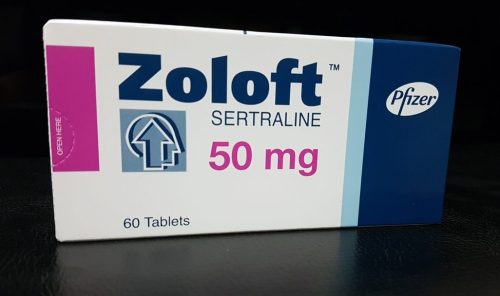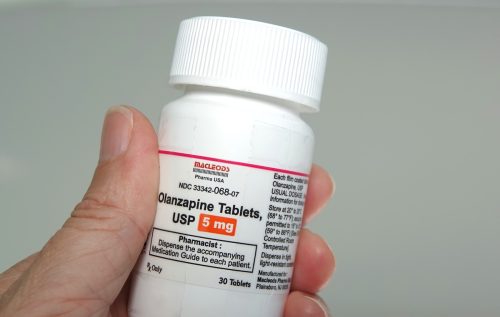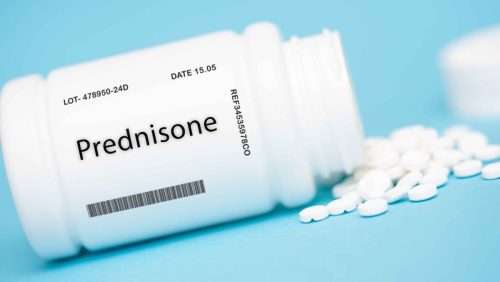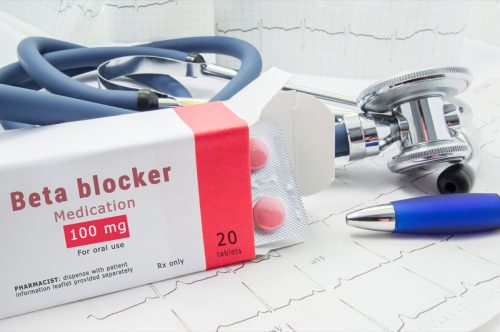6 Medications That Could Be Making You Gain Weight, Doctors Say
If the number on the scale is creeping up, these could be to blame.

With many medications, it comes down to assessing the pros and cons. Antidepressants can cause night sweats, but that might be a small price to pay for managing your anxiety. Some hormonal meds can lead to acne flare-ups, but in the long run, they can help with fertility or menstrual symptoms. But perhaps one of the most dreaded medication side effects is weight gain. Read on to learn about six common meds that are common culprits.
RELATED: Doctors Warn This Common Medication May Be Linked to Dementia Risk.
1
Antidepressants

The U.S. Centers for Disease Control and Prevention (CDC) estimates that one in eight U.S. adults takes an antidepressant. But of all the medications that might cause weight gain, antidepressants perhaps get the worst rap. Unfortunately, though, the side effect can be real.
Selective serotonin reuptake inhibitors, or SSRIs, are the most commonly prescribed antidepressants in the U.S. These include escitalopram (commonly known by the brand name Lexapro), paroxetine (Paxil), fluoxetine (Prozac), and sertraline hydrochloride (Zoloft).
Tricyclic antidepressants (TCAs) are an older class of antidepressants and include amitriptyline (prescribed under the brand names Elavil and Vanatrip), nortriptyline (Aventyl and Pamelor), and amoxapine (Asendin).
TCAs are less prescribed today because they tend to cause more overall side effects, including worse weight gain than their alternatives.
However, both classes of drugs can lead to weight gain over time, “by altering appetite regulation, slowing metabolism, or increasing cravings for carbohydrates,” according to Will Haas, MD, an integrative and family medicine doctor, and the founder and CEO of VYVE Wellness.
Why, exactly, does this happen? Harvard Health explains that these medications work by increasing serotonin levels in the brain. After taking these meds for more than a year, you may experience downregulation of serotonin receptors, “which subsequently causes cravings for carbohydrate-rich foods such as bread, pasta, and sweets that ultimately may lead to weight gain.”
2
Antipsychotics

Nicholas Dragolea, MD, a London-based general practitioner at My Longevity Centre, says, “one of the most common culprits for causing weight gain is second-generation antipsychotics,” used to treat conditions such as schizophrenia, bipolar disorder, or depression.
These include olanzapine (prescribed under the brand name Zyprexa), risperidone (Risperdal), quetiapine (Seroquel), and clozapine (Clozaril).
Haas notes that these drugs can often cause rapid weight gain. “They can impair insulin sensitivity, increase appetite, and disrupt metabolic signaling pathways, which makes it much harder for the body to regulate fat storage,” he explains.
RELATED: If You’re Over 65, This Common Pain Reliever Could Cause “Serious Complications,” Study Finds.
3
Corticosteroids

Corticosteroids such as Prednisone are used to treat everything from allergies and asthma to endocrine and kidney problems.
However, Haas points out that these drugs “can lead to fluid retention, increased appetite, and redistribution of fat—especially around the abdomen and face.”
“Even short-term use can impact weight, and longer use makes it harder to manage blood sugar and fat metabolism,” he adds.
4
Insulin and Sulfonylureas

“Ironically, some medications used to treat diabetes can actually cause weight gain,” notes Haas.
Insulin and sulfonylureas (i.e., Glipizide and Glyburide) “promote fat storage and reduce the body’s ability to burn fat efficiently, especially if diet and activity levels are not also adjusted,” he shares.
According to the National Library of Medicine (NLM), research shows that insulin-related weight gain is dose-dependent and is “more pronounced in injection regimens that include rapid-acting insulin compared to basal insulin only.”
To counteract this, the addition of metformin to insulin therapy “reduces the effects of insulin on body weight by decreasing energy intake.” (Metformin is another medication approved to treat type 2 diabetes.)
As for sulfonylureas, the NLM says that weight gain is “most pronounced in the first months of therapy and then reaches a plateau.”
RELATED: Doctors Warn That Drugs Like Ozempic Are Making You “Skinny Fat.”
5
Beta-Blockers

People taking beta-blockers such as Metoprolol and Propranolol—which are often prescribed to treat high blood pressure and heart conditions, as well as migraines, anxiety, and glaucoma—initially gain an average of two to three pounds, according to Mayo Clinic.
“Beta-blockers may contribute to modest weight gain by slowing down metabolism and causing fatigue, which can reduce physical activity levels,” Haas explains. “They also alter how your body breaks down fats and carbohydrates.”
The experts at Mayo Clinic warn that if you’re taking the beta-blocker for heart failure and gain more than that, it could be a sign of dangerous fluid buildup, and you should contact your doctor.
6
OTC Allergy Medications

It’s not just prescription medications that may cause you to not fit into your old clothes anymore: Over-the-counter (OTC) allergy meds can do it, too.
Antihistamines such as fexofenadine (Allegra) and cetirizine (Zyrtec) are among those that studies have shown to be associated with weight gain, especially in children, per Verywell Health. They say that while scientists haven’t pinpointed exactly why this is, it may be due to increased appetite, lethargy, or metabolic changes.
RELATED: What Happens If You Take Benadryl Before Bed Every Night, Doctors Say.
What to do if you believe your medication is causing you to gain weight:

Julio Baute, MD, a medical reviewer at Invigor Medical, says that when a patient of his is gaining weight from a medication, he first confirms their dose and then looks “for equally effective, weight-neutral alternatives.”
“If the drug is indispensable, we tighten diet quality, especially protein, add a modest calorie goal, and prioritize daily steps and strength training to keep metabolism from drifting any lower,” he shares.
Of course, everyone’s case is different, so if you’re concerned about weight gain and medications you’re taking, whether prescription or OTC, speak with your healthcare provider.
- Source: https://www.cdc.gov/nchs/products/databriefs/db377.htm
- Source: https://www.health.harvard.edu/blog/managing-weight-gain-from-psychiatric-medications-202207182781
- Source: https://www.ncbi.nlm.nih.gov/books/NBK537590/
- Source: https://www.mayoclinic.org/diseases-conditions/high-blood-pressure/expert-answers/beta-blockers/faq-20058385
- Source: https://onlinelibrary.wiley.com/doi/10.1038/oby.2010.176





















